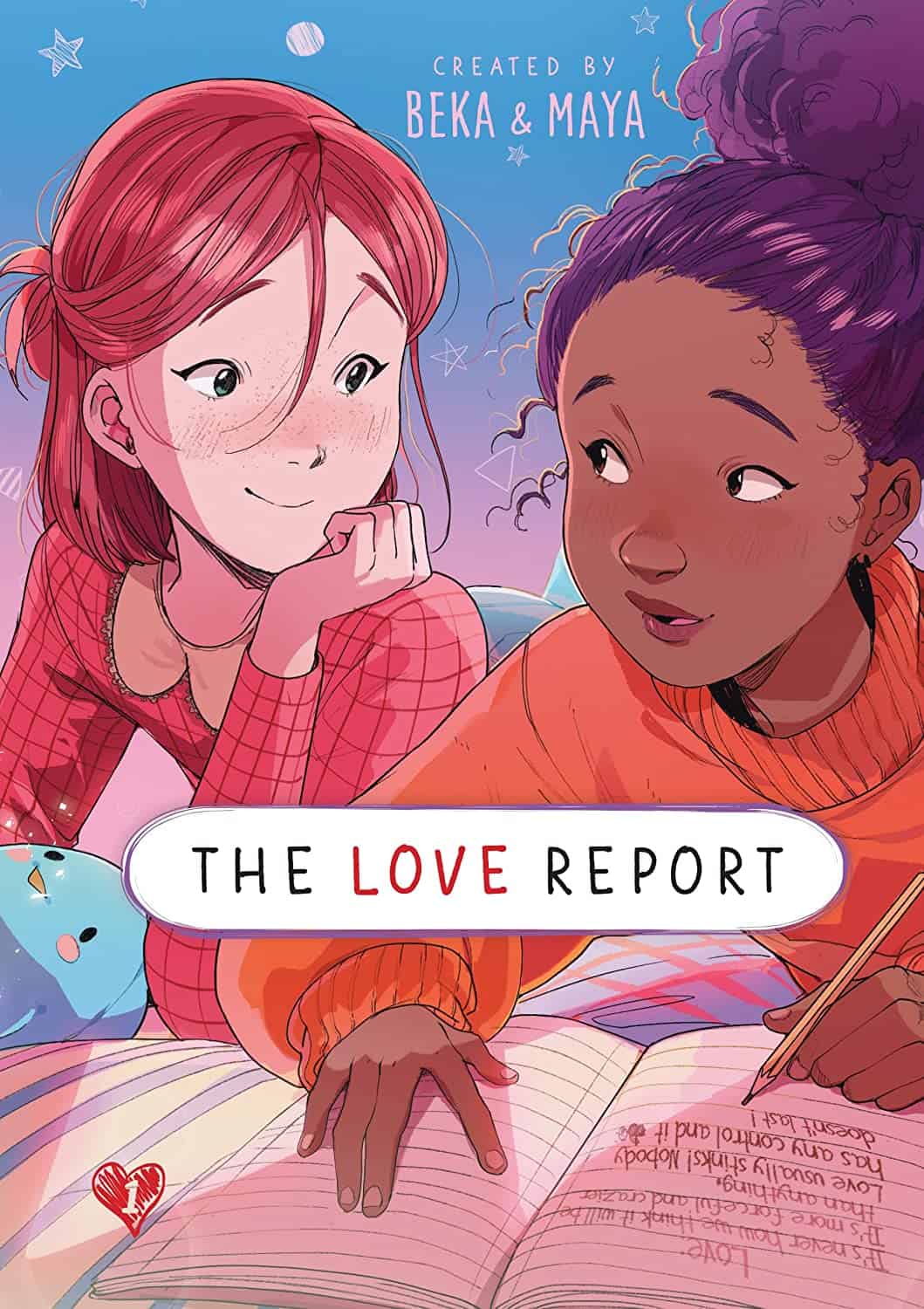Patricia Highsmash
The Love Report
by Travis Hedge Coke

The Love Report is robust most where it is delicate.
While true that the emotions of youth are mixed up, the social politics of children, blunt, it is untrue that subtlety and clarity are beyond the young of age, or that the young of age are also, always, young of heart.
Maya and BeKa create, in The Love Report, a clearheaded and detail-packed brisk story of children in love, children not in love, and children figuring out what love is. We do not, collectively, agree what love is or why it is for, what it is up to or where it measures most, so why should children?
This is a comic made for children, for tweens and teens and under-tens and over-forties. If love does much, it makes older children of all of us.
The loner, on their own, minding their own business, who some kid said was “easy,” without really probably knowing what easy even means. The person who says they do not believe in love or need love, but what is love? they can less than answer. Yearning for, but not believing we have earned love. Immature positions, but positions we all occupy at all stages, all ages, whether we should already know better or not.
In my teens, I made side money writing love poems and letters for schoolmates who didn’t want risk their own words. Sometimes, I added in ridiculous things, or nonsense, not to be cruel, but because I had discovered that it could make someone feel endeared if they caught it. You put in “flaxen hair” for a letter to a brunette or a compliment about muscles or tone to someone who did not especially have an adonis physique. To write with love’s eyes on.
At least three girls I knew during those years, classmates, wrote smut and sold it to other kids.
If you did not learn the birds, bees, and broderie from school educational shorts or children’s books, someone brought in bodice-rippers or Playboy or the Top 10 Ways to Please from an issue of Cosmopolitan. And, beyond those: other children. All the children. And, afternoon television. And, of course, now, the internet, streaming channels, et cetera.
But, love is not torn bodice novels or streaming porn. Kids know that. You know that. We forget it sometimes, and we overreact.
And, if you think your children do not know that dirty movies or sex in books exists, I have no news for you; the news passed you already.
The girls of The Love Report confuse sex and love, or conflate, but like us, they are not always sure where the two intermix or if the intermixing means they are related. They have an appropriate ignorance of details and specificity, which ultimately, lets children reading the comic both be happy to sometimes be savvier than the characters they are reading about and to be reassured when a character who is smart, capable, and fun, also shares some ignorance they had possessed.
We increasingly enter dark times in all anglophone nations, when it comes to conflating sex and love, gender and sex, knowledge with risk and ignorance with safety.
During The Love Report, our characters cause havok, as they gain knowledge, sometimes retreat into comforting ignorance, and they also promote risks through ignorance and find surety in learning new things. It cannot go only one way or the other. No matter how much someone cozying up to every fascist in the United Kingdom or the United States as a crusade to get people beat up for trying to use restrooms comfortably, no matter the lengths of book-banning and reader-shaming coming from conservative and corrupt corners, we cannot allow a total retreat of society and culture into forced naiveté and false nostalgia without criticism, without a fight.
An important aspect of that fight is arming children with knowledge and with the knowledge that they can be curious, that they can question, that they deserve education, truth, and genuine protection. And, the knowledge that they, even as children, can cause others to be at risk, to be hurt, to be misled, confused, or misinformed.
The art in The Love Report, like the writing, is strong on precise details which evoke a full world of implications. Stray hairs and elided backgrounds immerse us without overwhelming. Every character has a range of caricature and subtlety just as true people do.
“Love makes you stupid,” is a summation written in the titular love report made by two characters, yet it is not, even then, the whole of their beliefs, nor the end of the report.
The Love Report is about responsibility. Of course, the kids making the report do not realize that as they compile and consider. And, when they do intuit that it is about responsibility, they may not know where that responsibility genuinely lies.
People make you feel responsible for things when you are not. You can be made to feel responsible to people you are not. True of the adult world and true of any children’s, because it is all one world, and we fumble through.





